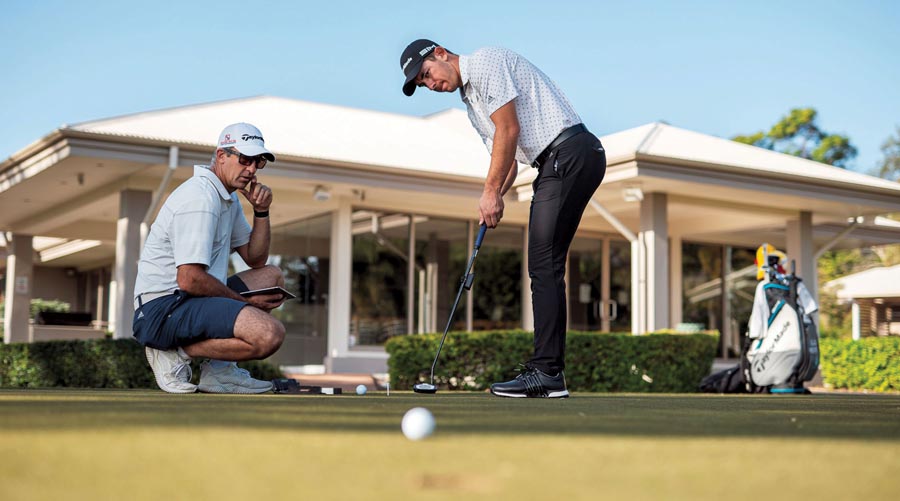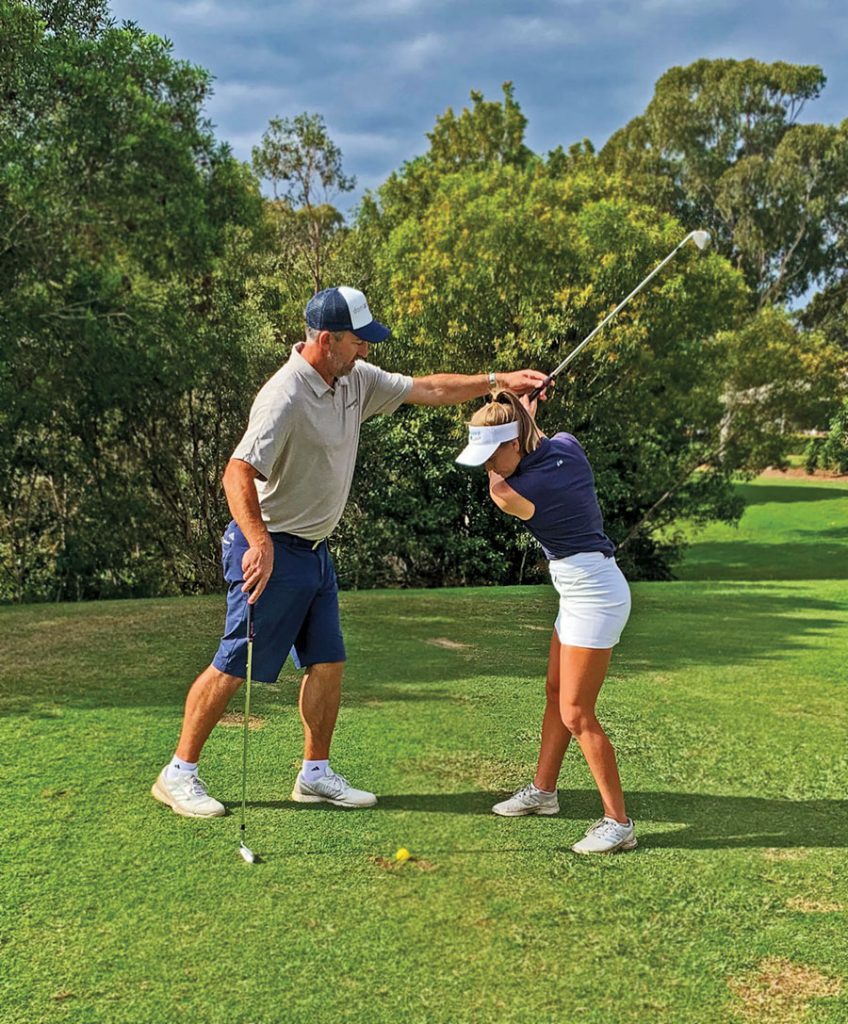By Peter Owen
DOM Azzopardi holds his mobile phone high in his hand. “I’ve got two 15-year-old identical twin daughters,” he says, “and I restrict the amount of time they’re allowed to use these.
“I hate seeing young people on phones. The girls say to me, ‘Dad, you’re the one that’s always on the phone – not us’.
“But it’s my job,” he says, again brandishing his phone. “I need this to do my job – to stay in touch with my golfers.”
Dom Azzopardi is the epitome of the modern high performance golf coach. Based at Peregian Springs on Queensland’s Sunshine Coast, he is in constant touch with his ‘stable’ of golfers, who live all over the world, and require his endless attention.
A former club pro who quit his job because it was becoming too much like a nine-to-five admin job, Azzopardi oversees a select group of talented golfers, committed to doing everything it takes to reach their absolute potential.
His students range from 11-year-old Ellianna Macrae – a near neighbour of Azzopardi, who describes the two-time Peregian ladies club champion as ‘amazing, the best 11-year-old I’ve ever seen’ – all the way to US and World Tour winner Lucas Herbert, ranked the 51st best golfer on the planet.
There are just 10 of them – and it is Azzopardi’s constant mission to allocate each one enough of his time so they are continually improving, always being given the support and the information they need to succeed.

He keeps an Excel spreadsheet of their commitments – upcoming tournaments, countries they’re visiting, requirements they have, overlaid with his own schedule, so he can best organise his time to help them.
And he uses the Skillest app – a platform for golf coaches and students to share video feeds, swing tips and conduct virtual lessons – to beat the tyranny of distance and redefine a modern coach’s relationship with his students.
“If, say, Lucas is having issues with his swing on the driving range in Orlando he can quickly film himself, shoot it to me on his Skillest app and within minutes I can respond and tell him how to fix the problem. I can even draw lines on the video to make it clearer.
“It’s a wonderful tool that came on the market at exactly the right time – when Covid struck,” he said. “It allowed me to provide virtual face-to-face lessons with a student on the other side of the world at a time when neither of us could travel.”
Azzopardi warns, however, that there’s a danger Skillest might encourage some coaches to take on too many students and lose the personal bond that he believes is essential in any good player-coach relationship.
“I made that mistake for a while,” he said. “I took on too many and I was on the phone for six hours a day. That’s not for me. I need to get to know my students as people, to find out what motivates them, what makes them tick.
“You’ve got to be invested and know the player – know how they’re feeling every minute of the day. Without that, I can’t do my job properly.”
When we spoke, Azzopardi was recently back from a three-week stay with Herbert in the US, followed by five days at Bonville where one of his students, New Zealand’s Momoka Kobori, was competing in the Australian Women’s Classic, a week after winning the NSW Ladies Open.
“It was a great opportunity for us,” he said. “We got through a heap of work – her driving, playing from uphill and downhill lies, approach shots. In the first round she shot three-over 75. It was important to me how she reacted to that, how she responded.”
Azzopardi is a constant traveller, keeping up with his students and being with them for important tournaments, wherever they may be. “I’m away 20 to 25 weeks a year,” he said.
“Lucas comes first. “He takes up most of my time. If he needs me, I’ll go to wherever he is.
“Next week I’ll be flying to Hawaii to work with Karis Davidson, who’s playing a tournament there, and another student, Jake Hennessy, has got his Canadian card, so that will take up a bit more time.”

Azzopardi says it’s not so much about the number of golfers under his care – it’s more about gauging, and then handling, the workload they create. “I have a family and I’m aware of the effect it has on them if I’m away too much, or the hours are too long,” he said.
Asked what makes a good coach, the former Victorian professional who spent a year on the Australasian Tour, pauses and thinks. “Honesty, I’d say, is the most important thing.
“You’ve got to be honest with them – even if it hurts. They need to know what I expect of them and if they’re not prepared to do that, then it won’t work. They’d best look for another coach.
“And a good coach should have very little ego – it’s not about yourself, it’s about the player.”
Azzopardi, who began playing golf when he was six, completed a PGA traineeship in Victoria before spending two years as head professional at the Gary Player Golf Academy in Singapore. On his return to Australia, he was head professional at Woodlands for six years, and at Ballarat for another six years.
But he always knew his passion was teaching and coaching and when he met 13-year-old Lucas Herbert at Ballarat 14 years ago, he saw the lad’s potential and took him under his wing. In 2014 he gave up his job in the Ballarat pro shop and became a full-time coach – albeit of just one player.
His wife’s parents owned a holiday home on the Sunshine Coast and Azzopardi was a regular visitor. In 2019, he made the move from Victoria to Queensland and based himself at the Peregian course. As well as coaching Herbert, he operated a lawn, garden and landscape business in the first few months on the Sunshine Coast, but always had the ambition to expand his coaching role.
“I wanted to help more than one player and I’ve gradually taken on more students,” he said. “Moving here was the best thing I did – the climate, lifestyle – and there’s no better place to bring up kids.”
